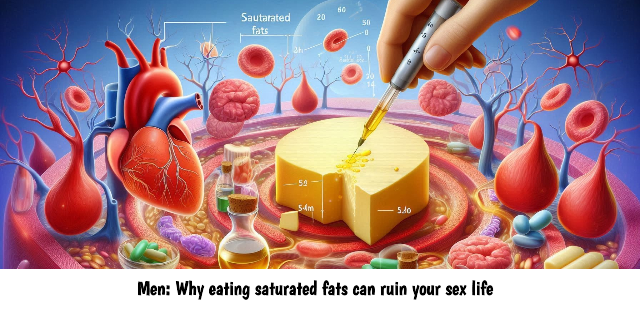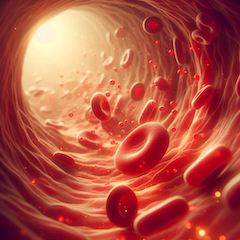How can what you eat affect your sex life? It all has to do with your arteries.
According to the National Institute of Diabetes and Digestive Kidney Diseases (NIDDK), Erectile Dysfunction is “a condition in which you are unable to get or keep an erection firm enough for satisfactory sexual intercourse.”[1]
A key factor in an erection is blood flow into the penis. The arteries of the penis are between 1 and 1.5 mm in diameter. These are much smaller than other arteries in the body: Coronary arteries have a diameter of 2.7 to 4.3 mm. [2]
These smaller arteries in the penis show negative effects of reduced blood flow sooner than larger arteries. So if something interferes with blood flow, like a disease of the arteries, the blood supply to the penis can be altered, leading to erectile dysfunction.
What can reduce blood flow? How do arteries become diseased?
To understand this, we need to discuss endothelium.
Over the last twenty-five years, research has discovered a new organ in the body: the vascular endothelium, or simply called the endothelium. The endothelium is the largest organ of the body, and consists of a single layer of endothelial cells that actively maintains all the blood vessels of the body. That’s around 60,000 miles of blood vessels.[3]
Endothelial cell function
These cells are critical to much of what happens in the body. Cells of the endothelium deliver nutrients and oxygen to the muscles of blood vessels and other tissue that surrounds them. They also send out signals to other cells in the body, like those of the immune system. They present antigens to T-cells and allow macrophages to move into surrounding tissues.
Endothelial cells also produce nitric oxide, a molecule that has been discovered to be very important for the functioning of blood vessels. They produce nitric oxide (chemical symbol NO) using nitric oxide synthase (eNOS).
Nitric oxide opens blood vessels so that blood flows more easily—a process called vasodilation— by causing relaxation of the muscle cells of the arteries.
But nitric oxide has other roles. Nitric oxide is anti-inflammatory, meaning it stops white blood cells from adhering to endothelial cells. Nitric oxide also regulates clotting, inhibiting platelets from clumping together. Moreover, it controls fluid, electrolytes and other substances passing from the blood to tissues. Finally, it keeps smooth muscle cells from multiplying.[4]
Erectile dysfunction and other cardiovascular disease are caused by a condition called endothelial dysfunction.
Endothelial dysfunction
When the work of the endothelium is disrupted, a lot can go wrong. Some conditions that are associated with endothelial dysfunction include atherosclerosis (disease of the arteries), hypertension (high blood pressure), cardiomyopathy (disease of heart muscle), retinopathy (disease of the retina of the eye), neuropathy (disease of peripheral nerves), and cancer. [5]
Dr. Francis Kim, at the University of Washington, has researched endothelial cells for a number of years. At a grand rounds presentation in 2022, he described how endothelial dysfunction occurs. One of his studies has looked at the effect of saturated fats on endothelial cells.
After exposing endothelial cells in cultures to saturated fats, he found a significant reduction in the production of nitric oxide compared to control. He hypothesized the cellular mechanism for this activity and discovered that a substance called IKK-beta is activated by saturated fats and reduces the production of nitric oxide.
When nitric oxide is reduced, endothelial cells release compounds like inflammatory cytokines, which relay messages to the immune system to fight off attackers like germs. They also release reactive oxygen species (ROS), which are unstable molecules containing oxygen that can cause damage to DNA, RNA and proteins and can also cause cell death.
If nitric oxide continues to be reduced over long periods of time, vascular damage occurs and the endothelial cells lose their membranes, slough off, die, and are released into circulation. So an initial insult of free fatty acid (saturated fat) actually sets off a vicious circle where nitric oxide production is reduced further and further.[4]
Evolution meets Western lifestyle
Why does this happen?
The cycle is actually an example of normal immune system behavior. If a virus or bacteria attacks the endothelium, it releases cytokines and gets the immune system involved. In this case, the endothelium wants the white blood cells to adhere to it and take care of the infection. Since nitric oxide reduces the ability of white blood cells to adhere to the endothelia cells, endothelial cells stop producing nitric oxide.
As Dr. Kim states, “This is an example of how our host-defense system has been hijacked by our Western lifestyle and it leads to low grade inflammation.” [4]
Back to the title
So how can eating saturated fats ruin your sex life?
Saturated fats cause the vascular endothelium to reduce the production of nitric oxide. Eventually, if this happens on a continuous basis, endothelial cells cannot function. The walls of blood vessels thicken (because without nitric oxide, smooth muscle cells proliferate). Blood vessels also become rigid because there is no vasodilation and relaxation of the blood vessels (no nitric oxide produced). The smaller blood vessels are the first affected by this, so the blood vessels of the penis have reduced blood flow. Erectile dysfunction can result.
And Erectile Dysfunction can actually predict cardiovascular disease (CVD) before you have any symptoms.[2] In fact, a man with Erectile Dysfunction might experience cardiovascular disease symptoms — chest pain, shortness of breath, coughing or wheezing, swelling in the legs, ankles, or feet, poor blood supply to legs and arms, fatigue and fast or uneven heartbeat — three to five years after they started having Erectile Dysfunction symptoms.[2,6]
So this is another reason to maintain a healthy diet!
References
1.https://www.niddk.nih.gov/health-information/urologic-diseases/erectile-dysfunction/definition-facts
2. Camelia Cristina Diaconu, Maria Manea, Dragos Radu Marcu, Bogdan Socea, Arsenie Dan Spinu & Ovidiu Gabriel Bratu (2019): The erectile dysfunction as a marker of cardiovascular disease: a review, Acta Cardiologica, DOI: 10.1080/00015385.2019.1590498
3. Rajendran P, Rengarajan T, Thangavel J, Nishigaki Y, Sakthisekaran D, Sethi G, Nishigaki I. The vascular endothelium and human diseases. Int J Biol Sci. 2013 Nov 9;9(10):1057-69. doi: 10.7150/ijbs.7502. PMID: 24250251; PMCID: PMC3831119.
4. Kim, F. (2021-22). Endothelial Function and Cardiovascular Disease.University of Washington Cardiovascular Grand Rounds. https://youtu.be/s6Geqf9YWe0?si=V6bUiUmhbG1kDS_D
5. Pi X. , Xie L. & Patterson C. (2018).Emerging Roles of Vascular Endothelium in Metabolic Homeostasis. Circulation Research. Volume 123, Number 4 https://doi.org/10.1161/CIRCRESAHA.118.313237







